
Cognitive Research-Principles and Implications
Scope & Guideline
Transforming Understanding of Cognitive Mechanisms.
Introduction
Aims and Scopes
- Cognitive Processes and Decision Making:
The journal emphasizes research on cognitive processes that influence decision-making, including how individuals assess information, manage cognitive load, and apply heuristics in real-world settings. - Human-Computer Interaction and Automation:
There is a strong focus on understanding how humans interact with automated systems and technology, including the implications of AI and machine learning on cognitive performance and trust. - Social Cognition and Perception:
Research on how social factors, such as group dynamics, biases, and social influences, affect cognitive processes and perceptions, particularly in contexts like face recognition and emotional interpretation. - Misinformation and Memory:
A consistent theme is the study of misinformation effects on memory, belief formation, and the correction of false information, especially in light of the digital information age. - Educational Applications of Cognitive Science:
The journal explores how cognitive principles can be applied to educational settings, including effective learning strategies, assessment techniques, and the role of technology in learning.
Trending and Emerging
- Impact of AI and Automation on Cognition:
Research exploring the implications of artificial intelligence and automation on human cognition is increasingly prominent, addressing how these technologies affect decision-making, trust, and cognitive load. - Social Media and Misinformation:
There is a growing emphasis on understanding the effects of social media on cognition, particularly regarding misinformation dissemination, belief formation, and strategies for combating false information. - Cognitive Load and User Experience:
Studies focusing on cognitive load in relation to user experience design are trending, particularly in the context of technology use, driving, and educational settings. - Health and Cognitive Function:
Emerging themes include the intersection of cognitive function and health behaviors, such as how cognitive biases influence health decisions, particularly in the context of the COVID-19 pandemic. - Diversity and Cognitive Processing:
Research examining the role of diversity, including race and gender, in cognitive processing and social perception is becoming increasingly relevant, reflecting broader societal discussions.
Declining or Waning
- Traditional Memory Studies:
Research focusing solely on basic memory processes, such as short-term and long-term memory, seems to be waning in favor of studies addressing the complexities of memory in real-world scenarios, particularly in relation to misinformation. - Basic Cognitive Neuroscience:
Studies that primarily examine fundamental cognitive neuroscience without practical applications or implications are becoming less prominent, as the journal shifts towards research with direct relevance to applied contexts. - Perceptual Studies in Isolation:
Research that examines perceptual processes in isolation, without considering their interactions with social, emotional, or technological factors, appears to be less frequent, reflecting a broader trend towards integrated approaches.
Similar Journals

Multisensory Research
Illuminating the Path of Sensory ExplorationMultisensory Research is a premier academic journal published by BRILL, dedicated to advancing the fields of cognitive neuroscience, computer vision, and sensory systems. Established in the Netherlands, the journal boasts a diverse scope, exploring the integration of sensory modalities in both experimental and cognitive psychology. With its converged years extending from 2013 to 2024, Multisensory Research has consistently contributed valuable insights, earning a well-regarded position within various quartiles, notably Q2 in Computer Vision and Pattern Recognition and Q2 in Ophthalmology as of 2023. The journal’s rankings reflect its significant impact, with placements such as rank #50 in Ophthalmology and rank #84 in Experimental Psychology, highlighting its relevance to today's interdisciplinary research efforts. Available as an open-access platform, Multisensory Research ensures that innovative research is accessible to a wide audience, making it an essential resource for researchers, professionals, and students alike who are engaged in the dynamic study of multisensory integration.
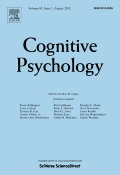
COGNITIVE PSYCHOLOGY
Transforming Cognitive Psychology Through ResearchCOGNITIVE PSYCHOLOGY is a premier academic journal published by Academic Press Inc. Elsevier Science, specializing in the dynamic and evolving field of cognitive psychology. With a significant history spanning from 1970 to 2024, this journal has established itself as a critical resource for researchers and professionals alike, boasting a distinguished ranking in the Q1 category across multiple disciplines, including Experimental and Cognitive Psychology, Neuropsychology, and Artificial Intelligence. Its impact factor, reflective of its influence and reputation within the academic community, positions COGNITIVE PSYCHOLOGY as an essential platform for disseminating cutting-edge research and theoretical advancements. Although it is not open access, subscribers gain exclusive insights into the latest findings that drive the field forward. The journal's commitment to fostering innovative research makes it an indispensable tool for those dedicated to understanding the complexities of human cognition.

MEMORY & COGNITION
Exploring the Depths of Cognitive ProcessesMEMORY & COGNITION is a premier journal published by SPRINGER, dedicated to advancing the understanding of cognitive processes related to memory. Established in 1973, this esteemed journal covers a wide range of topics within the fields of experimental and cognitive psychology, neuropsychology, and physiological psychology, cementing its status as a leading voice in the arts and humanities. With an impressive impact factor and a consistent Q1 ranking across multiple categories, MEMORY & COGNITION attracts high-quality research that elucidates the intricacies of memory function and cognition. The journal is nestled within the competitive landscape of academic publishing in the United States and maintains robust accessibility options, inviting both quantitative and qualitative analyses from researchers, professionals, and students alike. By fostering interdisciplinary dialogue and collaboration, this journal plays a pivotal role in shaping the future of cognitive research, making it an invaluable resource for its readership.

Journal of Cognitive Science
Pioneering Research in Cognitive ProcessesThe Journal of Cognitive Science, with ISSN 1598-2327, is a distinguished publication from SEOUL NATL UNIV, INST COGNITIVE SCIENCE, focusing on the multidisciplinary field of cognitive science. Established in 2016, this journal aims to advance knowledge in various domains, including Artificial Intelligence, Cognitive Neuroscience, and Experimental Psychology, while also delving into Linguistics and Language. Although currently categorized in Q4 for several subjects in the 2023 rankings, it presents an invaluable platform for innovative research and scholarly discourse, providing insights that connect cognitive processes with practical applications, thus fostering cross-disciplinary collaboration. Located in South Korea, the journal adheres to rigorous academic standards, inviting submissions that contribute significantly to understanding cognition in a digital age. While it does not offer Open Access, readers can access articles through university libraries and academic databases, engaging with the latest findings and theories that shape the future of cognitive science.

PSYCHOLOGIA
Cultivating a Deeper Understanding of the MindPSYCHOLOGIA is a distinguished academic journal published by the Psychologia Editorial Office, focusing on the broad field of psychology. Originating from Japan, the journal serves as a platform for innovative research and insights into various psychological phenomena, contributing significantly to the advancement of psychological knowledge since its establishment in 1996. With an ISSN of 0033-2852 and an E-ISSN of 1347-5916, PSYCHOLOGIA primarily targets researchers, professionals, and students who are passionate about the intricacies of human behavior and cognition. Currently categorized in the Q4 quartile of psychology (miscellaneous) based on 2023 metrics, it holds a Scopus rank of #157 out of 216, indicating its developing presence within the academic community. Despite being published without open access options, the journal remains committed to fostering scholarly dialogue and disseminating significant findings that shape contemporary psychological research. As it converges towards its issue set for 2024, PSYCHOLOGIA continues to be an essential resource for those seeking to deepen their understanding of psychological sciences.
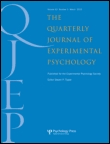
QUARTERLY JOURNAL OF EXPERIMENTAL PSYCHOLOGY
Connecting Scholars, Ideas, and InnovationsQuarterly Journal of Experimental Psychology, published by SAGE Publications Ltd, is a leading peer-reviewed journal that serves as a vital resource in the fields of experimental and cognitive psychology, neuropsychology, and medicine. With an impactful contribution to psychological research, the journal is recognized for its rigorous methodology and empirical studies, holding a notable ranking among its peers—finding itself in the Q2 quartile across several categories. With its origin tracing back to 2006, Quarterly Journal of Experimental Psychology significantly influences the academic discourse until its latest published findings in 2024. Catering to a diverse audience of researchers, professionals, and students, this journal provides Open Access options, enhancing the reach and accessibility of cutting-edge psychological research. By focusing on innovative approaches and findings, it aims to bridge theoretical understanding with practical application, hence fostering advancement in multiple related disciplines. For those committed to understanding the complexities of human behavior and cognitive processes, this journal remains an essential reference point.
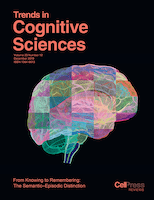
TRENDS IN COGNITIVE SCIENCES
Transforming Perspectives in Experimental PsychologyTRENDS IN COGNITIVE SCIENCES, published by CELL PRESS, stands as a premier platform for the dissemination of high-quality research in cognitive neuroscience, experimental psychology, and neuropsychology. With an impressive impact factor and consistently placed in the Q1 category across multiple dimensions of cognitive research, this journal not only ranks in the top tier of its fields—holding the 1st position in both Cognitive Neuroscience and Neuropsychology but also boasts an exceptional percentile ranking of 99. As it converges from 1997 to 2024, it reflects the evolving landscape of cognitive sciences, making it a vital resource for researchers, professionals, and students seeking to stay updated on influential trends and groundbreaking studies. Though not an open-access journal, TRENDS IN COGNITIVE SCIENCES offers readers access to a wealth of information that shapes our understanding of complex cognitive processes and behaviors.
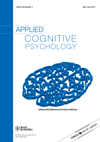
APPLIED COGNITIVE PSYCHOLOGY
Exploring the Intersection of Theory and Practice in Cognitive PsychologyApplied Cognitive Psychology, published by Wiley, is a premier academic journal dedicated to the innovative exploration of cognitive psychology and its applications in real-world contexts. With an ISSN of 0888-4080 and an E-ISSN of 1099-0720, this esteemed publication has been at the forefront of its field since its inception in 1987. The journal holds a remarkable Q1 ranking in Arts and Humanities (miscellaneous), alongside significant positions in developmental and educational psychology as well as experimental and cognitive psychology, reflecting its influential role in advancing knowledge and practices. Although it does not offer open access options, Applied Cognitive Psychology remains a vital resource for researchers, professionals, and students seeking to deepen their understanding of cognitive processes and their implications across various domains. By effectively bridging theoretical insights with practical applications, the journal plays an essential role in fostering dialogue within the scientific community and contributes to ongoing advancements in the field.
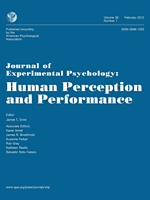
JOURNAL OF EXPERIMENTAL PSYCHOLOGY-HUMAN PERCEPTION AND PERFORMANCE
Transforming understanding through groundbreaking psychological studies.JOURNAL OF EXPERIMENTAL PSYCHOLOGY: HUMAN PERCEPTION AND PERFORMANCE, published by the American Psychological Association, stands as a premier outlet for scholarly research in the fields of psychology and neuroscience. This esteemed journal, identified by its ISSN 0096-1523 and E-ISSN 1939-1277, provides an essential platform for groundbreaking studies focusing on human perception, cognitive processes, and performance. With a remarkable impact reflected in its Q1 ranking across multiple categories including Arts and Humanities, Behavioral Neuroscience, and Experimental and Cognitive Psychology, this journal maintains a prestigious position in academic discourse. Researchers and practitioners can look forward to contributing to and accessing a repository of knowledge that spans nearly five decades, with articles that adhere to the highest scientific standards. As a valuable resource without open access constraints, it invites a wide readership engaged in advancing psychological science and understanding the intricacies of human behavior.

Wiley Interdisciplinary Reviews-Cognitive Science
Unveiling innovative research in cognitive science.Wiley Interdisciplinary Reviews-Cognitive Science (ISSN: 1939-5078, E-ISSN: 1939-5086), published by WILEY, stands as a premier academic journal dedicated to advancing the understanding of cognitive science through an interdisciplinary approach. Since its inception in 2010, the journal has rapidly established itself as a leading source of knowledge, achieving a Q1 ranking in the 2023 category of Medicine, Neuroscience, and Psychology, underscoring its significant impact within these fields. With a Scopus ranking of #27 in General Psychology and #30 in General Neuroscience, it offers researchers, professionals, and students access to cutting-edge research that bridges various disciplines, fostering collaboration and innovation. Though not openly accessible, this journal is critical for those aiming to stay at the forefront of cognitive science research, providing comprehensive reviews that synthesize emerging findings and highlight future directions for study.